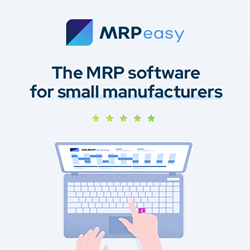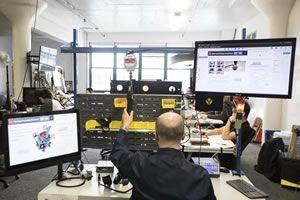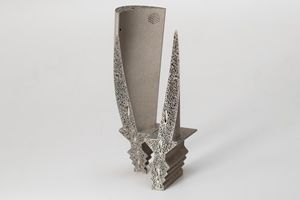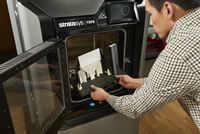The factory of the future is here, and it's digitized
Scott Kirsner for Boston Globe: The revolution is about three things: more advanced software for designing things; devices like 3-D printers that can quickly crank out a prototype; and robots and other technologies that will make the factory floor more efficient and flexible.
The future of additive manufacturing is all about design
Sarat Babu for The Engineer: If were going to unlock the full potential of 3D printing well need to fundamentally rethink the design process, writes Sarat Babu, founder of Betatype.
World's Largest Search Engine for 3D Printable Models Launched
After a developing period of 1.5 years 3D Ninja, the largest reseller of 3D printers in The Netherlands, officially launches http://www.ifind3d.com, the world's largest search engine for 3D printable models, containing 740.029 designs.
Adidas reveals the first 3D-printed shoe it'll mass-produce
James Vincent for The Verge: The company says 100,000 pairs of Futurecraft sneakers will be made by the end of 2018
Stratasys launches new rapid prototyping Engineering-Grade 3D Printing Solution: The F123 Series
"Today there is a vast market opportunity in product prototyping that we feel is not being addressed by current 3D printing systems. The launch of the Stratasys F123 Series targets these product design workgroups, industrial designers, engineers, students and educators who demand a professional quality rapid prototyping solution that's simple to use, produces reliable, engineering-quality results, integrates perfectly within an office or lab setting, and is affordable to own and operate," said Zehavit Reisin, Vice President, Head of Rapid Prototyping Solutions, Stratasys. "As the company that invented FDM, Stratasys brings a rich pedigree to the F123 Series, providing our customers an optimal balance between usability and high performance." Full Press Release.
MIT's Foundry software is the 'Photoshop of 3D printing'
Andrew Dalton for enGadget: Because the materials from a 3D printer aren't the most functional, their output has largely been limited to prototyping in the past. That should change in the near future with devices like MIT's own MultiFab, which can print up to 10 different materials at a time, but it still doesn't solve the problem of how to design such complex objects. That's where the new program called Foundry, created by MIT's Computer Science and Artificial Intelligence Laboratory comes in.
According to MIT CSAIL, Foundry can import objects designed with traditional CAD programs like SolidWorks and then assign specific materials or properties to different parts of the object. While creating a multi-material object in the past might have required days of work and multiple 3D printers to create (assuming it was possible with existing technology at all), CSAIL says these sorts of designs can now be created in mere minutes. Rather than manufacturing a separate piece for each material in the finished product, the entire object can now be printed in one fell swoop. Cont'd...
Special Tradeshow Coverage for FABTECH
FABTECH will be held from November 16th - 18th in Las Vegas, Nevada. This ManufacturingTomorrow.com Special Tradeshow report aims to bring you news, articles and products from this years event.
This new 3D-printing pen draws with wood, copper, and bronze
James Vincent for The Verge: 3Doodler's 3D-printing pens have always had a lot of potential (who doesn't want a souped-up glue gun that can draw 3D structures in midair?), but in our hands-on with the pens, their rough build quality means they come across more as toys than serious design tools. The company's latest model, the 3Doodler Pro, wants to shake up this perception, offering professional users more control, faster-setting plastics, and a whole new range of materials to work with.
Some of the new filaments on offer are pretty wild, too. 3Doodler says the Pro supports materials including wood, copper, bronze, nylon, and polycarbonate. Obviously, this doesn't mean you'll be sticking a length of dowel in the back of the Pro to draw tiny pieces of wooden furniture — instead, these new materials blend elements of their namesake into the plastic standard filament. Cont'd...
The Questions Executives Should Ask About 3D Printing
Channing Flynn for Harvard Business Review: Most hearing aids in the U.S. are now custom-made on 3D printers. The U.S. Food and Drug Administration recently approved the first 3D-printed pills. Carmakers have started using 3D technology to produce parts. And last year saw the first demonstration of a digital printer producing multilayer, standards-based circuit boards. Imagine the changes afoot in the pharmaceutical, medical device, automotive, and consumer electronics industries.
3D printing is poised to redefine global manufacturing and distribution. It could upend supply chains, business models, customer relationships, and even entrepreneurship itself. It may do to physical goods what cloud computing is now doing to digital services; what the PC, internet, and smart mobility have done to personal computing; and what outsourcing did to software development and business processing — take mass distribution and innovation to the next level while realigning the very geography of work and trade. Cont'd...
Records 31 to 39 of 39
Featured Product

MRPeasy - ERP for Small Manufacturers That Delivers Results
Always know what you have in stock and what you'll need to fulfill orders. Never forget to order parts on time or fail to notice a late delivery from your vendor. Easily create manufacturing orders and schedule them automatically according to resource availability or delivery deadline. Generate accurate cost and lead time estimates and provide customers with quick quotes. Receive notifications when orders are late or inventory levels reach a critical point. Ensure seamless communication between sales, production, warehousing, procurement, administration, and finance. Integrate with popular accounting, CRM, and e-commerce apps. MRPeasy is an ERP software for small manufacturers that gives you all that and more. Our users report a 54% average improvement in the overall performance of their business and a 42% increase in on-time deliveries. Try for free, no credit card needed.
Manufacturing and Automation - Featured Company

maxon group
maxon is a leading supplier of high-precision DC brush and brushless servo motors and drives. These motors range in size from 4 - 90 mm and are available up to 500 watts. We combine electric motors, gears and DC motor controls into high-precision, intelligent drive systems that can be custom-made to fit the specific needs of customer applications.







.jpg)
